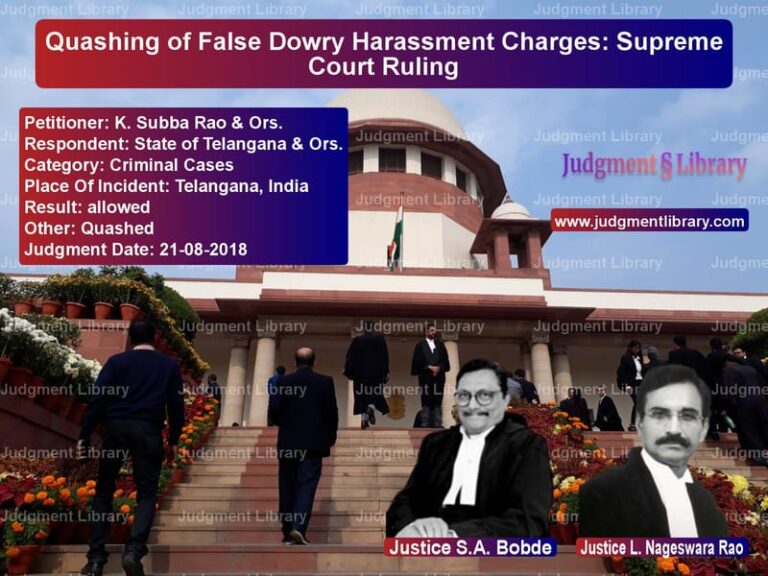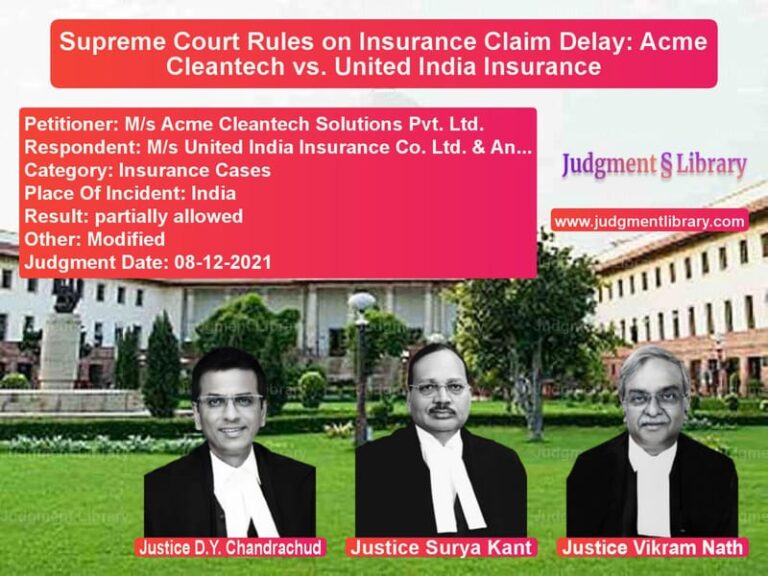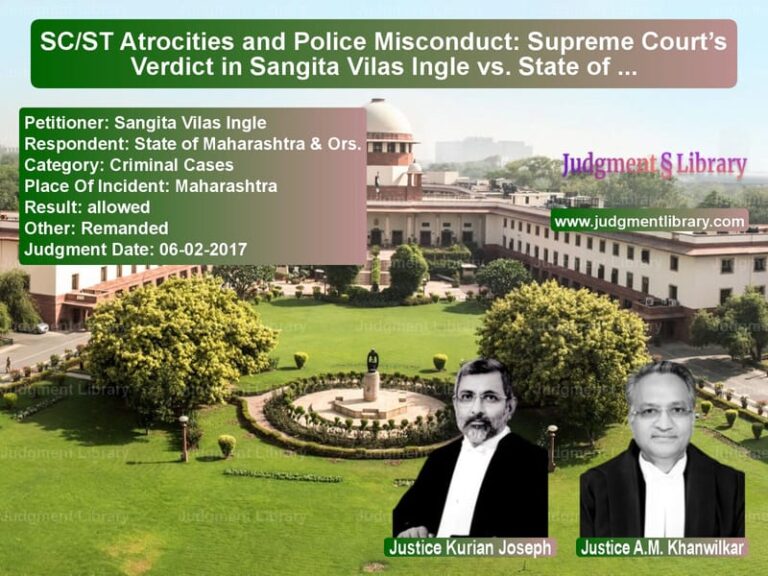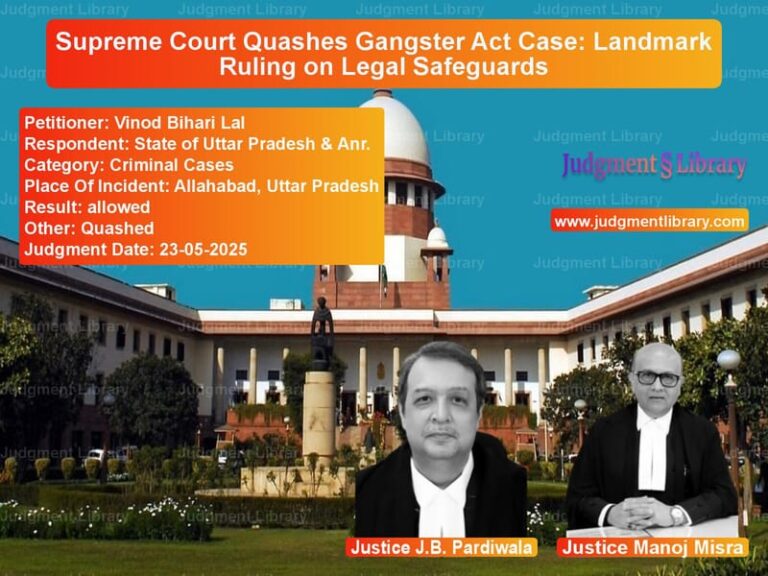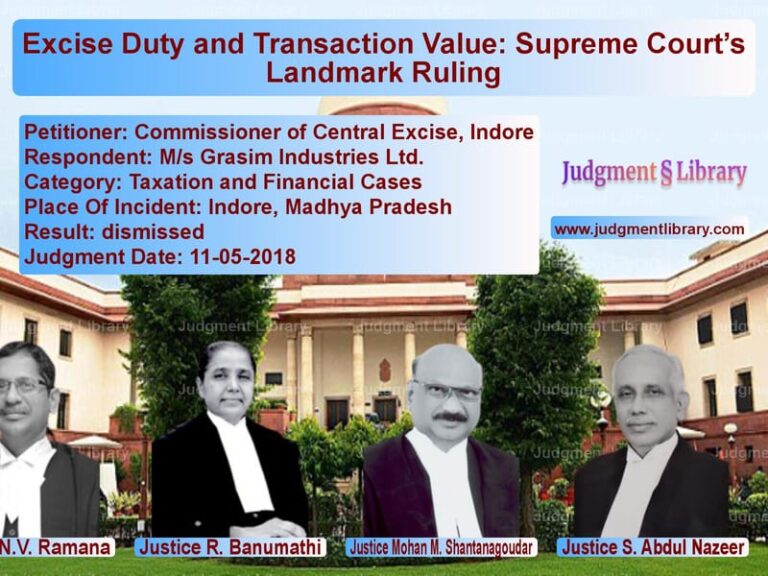Supreme Court Upholds NCLAT’s Ruling on Financial Creditor Status Under IBC
The case of Global Credit Capital Limited & Anr. vs. Sach Marketing Pvt. Ltd. & Anr. involved a crucial ruling on whether an entity qualifies as a financial creditor under the Insolvency and Bankruptcy Code, 2016 (IBC). The Supreme Court was tasked with determining if security deposits made by a sales promoter to a corporate debtor constitute financial debt, thereby granting the creditor the status of a financial creditor.
The Supreme Court upheld the decision of the National Company Law Appellate Tribunal (NCLAT), affirming that the amounts deposited by the creditor had the commercial effect of borrowing and therefore qualified as financial debt under the IBC.
Background of the Case
The primary issue revolved around agreements dated April 1, 2014, and April 1, 2015, between the corporate debtor, Mount Shivalik Industries Limited, and the first respondent, Sach Marketing Pvt. Ltd.. These agreements appointed the respondent as a sales promoter for beer manufactured by the corporate debtor in Ranchi, Jharkhand. A key condition required the respondent to deposit security money with the corporate debtor.
Under the agreements:
- The respondent was required to deposit Rs. 53,15,000 as security.
- The corporate debtor agreed to pay interest on Rs. 7,85,850 at a rate of 21% per annum (later increased to Rs. 32,85,850 in 2015).
During insolvency proceedings against Mount Shivalik Industries Limited, the respondent initially filed its claim as an operational creditor but later refiled as a financial creditor. The NCLT rejected this classification, prompting an appeal before the NCLAT, which ruled in favor of the respondent, recognizing it as a financial creditor.
Key Legal Issues
- Whether the security deposit made by the respondent qualifies as financial debt under the IBC.
- Whether a contractual agreement for service can also create a financial obligation.
- Whether the payment of interest on the security deposit constitutes a transaction having the commercial effect of borrowing.
Arguments by the Appellant (Global Credit Capital Limited)
The appellant challenged the NCLAT ruling, arguing:
“The agreements clearly establish that the respondent was appointed to render marketing services, making it an operational creditor rather than a financial creditor.”
The appellant further contended:
- The security deposit was a condition for being appointed as a sales promoter and not intended as a financial arrangement.
- Security deposits do not qualify as financial debt because they do not constitute funds borrowed for business operations.
- Simply booking or paying interest does not automatically convert a security deposit into financial debt.
Arguments by the Respondents
The respondent countered these claims, asserting:
“The corporate debtor acknowledged its liability for interest payments across multiple financial years, classifying the deposit as a long-term liability.”
The respondent relied on key facts such as:
- The corporate debtor deducted TDS on interest payments for three financial years.
- The agreement included a provision ensuring repayment with interest, satisfying the IBC definition of financial debt.
- The transaction had the commercial effect of borrowing, which is covered under Section 5(8)(f) of the IBC.
Supreme Court’s Analysis
1. Definition of Financial Debt Under IBC
The Court examined Section 5(8) of the IBC, which defines financial debt as:
“A debt along with interest, if any, which is disbursed against the consideration for the time value of money.”
The Court held that the security deposit met these criteria since it was repayable with interest, thereby qualifying as financial debt.
2. Commercial Effect of Borrowing
The Court referenced its previous rulings in Swiss Ribbons Pvt. Ltd. v. Union of India (2019) and Pioneer Urban Land & Infrastructure Ltd. v. Union of India (2019), stating:
“A transaction that functions as a financing arrangement, even if not labeled as a loan, can still have the commercial effect of borrowing.”
Since the security deposit was treated as a long-term liability in the corporate debtor’s financial statements, the Court deemed it a borrowing.
3. Distinction Between Financial and Operational Debt
The Court clarified that while the agreement described the respondent as a service provider, the financial terms established a lending relationship:
“The security deposit was not linked to the service provided, making it distinct from operational debt.”
The Court emphasized that an operational debt must arise directly from goods or services rendered, which was not the case here.
Final Judgment
The Supreme Court upheld the NCLAT’s decision, ruling:
“The amounts covered by the security deposits under the agreements constitute financial debt. Consequently, the respondent qualifies as a financial creditor under the IBC.”
It directed the resolution professional to continue with the Corporate Insolvency Resolution Process (CIRP) accordingly.
Key Takeaways from the Judgment
- A financial transaction’s classification under the IBC depends on its substance rather than its label.
- Security deposits with interest may be considered financial debt if they exhibit the commercial effect of borrowing.
- The repayment structure and financial treatment of a deposit determine whether it qualifies as financial debt.
- Entities involved in financing corporate debt, even indirectly, may be treated as financial creditors.
- The ruling reaffirms that service contracts with financial elements require careful scrutiny under IBC provisions.
Judgment Date: April 25, 2024
Judges: Abhay S. Oka, Pankaj Mithal
Petitioner Name: Global Credit Capital Limited & Anr..Respondent Name: Sach Marketing Pvt. Ltd. & Anr..Judgment By: Justice Abhay S. Oka, Justice Pankaj Mithal.Place Of Incident: Jharkhand.Judgment Date: 25-04-2024.
Don’t miss out on the full details! Download the complete judgment in PDF format below and gain valuable insights instantly!
Download Judgment: global-credit-capita-vs-sach-marketing-pvt.-supreme-court-of-india-judgment-dated-25-04-2024.pdf
Directly Download Judgment: Directly download this Judgment
See all petitions in Bankruptcy and Insolvency
See all petitions in Corporate Compliance
See all petitions in Company Law
See all petitions in Judgment by Abhay S. Oka
See all petitions in Judgment by Pankaj Mithal
See all petitions in dismissed
See all petitions in supreme court of India judgments April 2024
See all petitions in 2024 judgments
See all posts in Corporate and Commercial Cases Category
See all allowed petitions in Corporate and Commercial Cases Category
See all Dismissed petitions in Corporate and Commercial Cases Category
See all partially allowed petitions in Corporate and Commercial Cases Category


